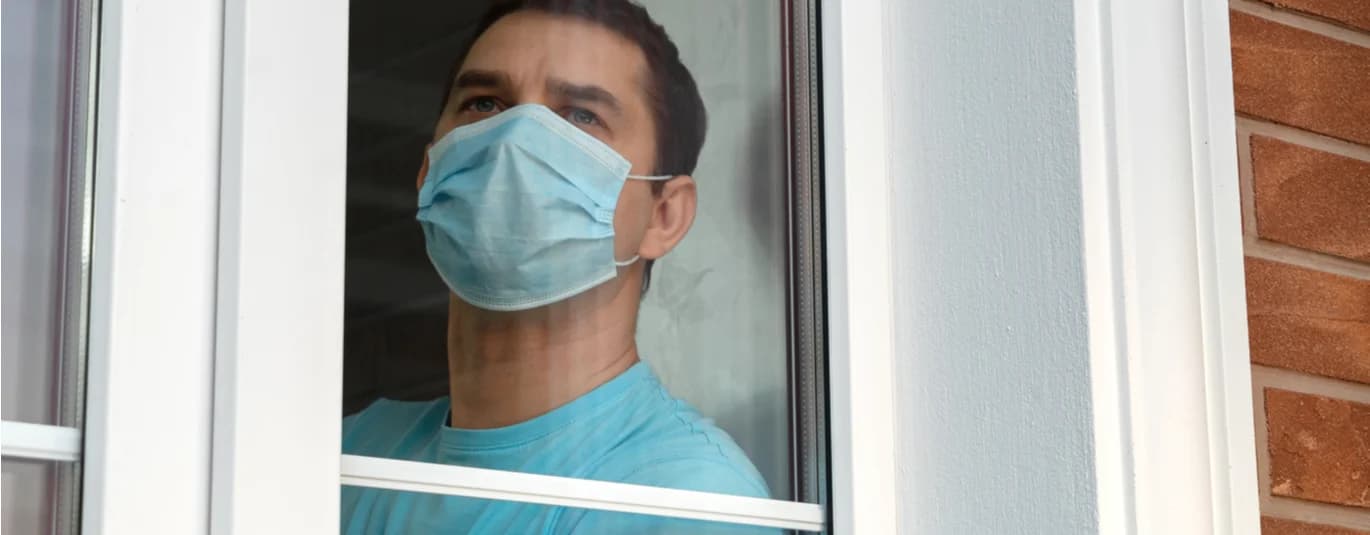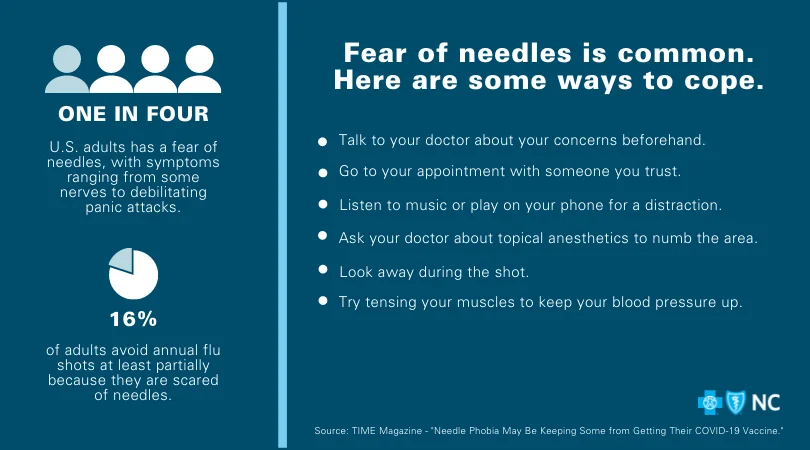
A few days ago, I talked to a relative who has chosen not to get a COVID-19 vaccine. When I asked her why she doesn’t want it, she shared that she’s terrified of what the vaccine would do to her.
When I listened to my relative speak, I could hear the fear in her voice. And it was real.
Of course, there are a lot of other reasons why people aren’t getting vaccinated. They’re making a political statement, they don’t have easy access to the vaccine, or they just don’t like being told what to do. But for millions of people, the number one roadblock is fear. But what’s driving that fear?
Here’s a breakdown of some of the top fears I’ve seen about the vaccine:
Fear of needles
Perhaps the easiest to address, but still a significant barrier for many, is needle phobia. Fear of needles is common, affecting about 25% of adults. And for some people, that fear is severe enough that they skip vaccinations.
Back in June, more than half of the adults who were not vaccinated against COVID-19 said they were afraid of needles. It wasn’t the vaccine itself but the injection that kept them from making an appointment.
The good news is that there are some tried and true methods for making vaccination less scary. Focusing on the end result, using topical anesthetics to help with pain, and bringing a trusted loved one or comfort item along to an appointment can help.

Fear of risk or harm.
Not everyone is adamantly anti-vaccine. Some people just need greater reassurance that these vaccines are, indeed, safe.
It’s reasonable, I think, to be hesitant about any new vaccine or medication. All medications come with some level of risk, and concerns about risk are valid. A good doctor will listen to a patient’s concerns and talk through them one by one, without minimizing or dismissing them. This is particularly important for patients who may have risk factors, like a history of allergic reactions to vaccines.
At the same time, the safety profile of the COVID-19 vaccines is remarkably reassuring. Almost two billion people have been vaccinated for COVID worldwide, which arguably gives health experts more information about the COVID vaccines’ safety than any other vaccine in history.
The COVID-19 vaccines have received overwhelming support from the medical community. More than 96% of doctors had been fully vaccinated back in June, which can help instill confidence in patients. Looking at the science behind the vaccines and the data about their safety and effectiveness can also sway a lot of people.
One potential hang-up, unfortunately, is that conspiracy theories about these vaccines are shockingly widespread. For some people, belief in these conspiracy theories is strong enough to erode trust in medical experts—so much so that even a conversation with a doctor is off the table.
Fear driven by conspiracy theories.
Even before COVID-19, a huge driving force behind vaccine hesitancy was online misinformation.
The number of conspiracy theories and myths out there about COVID-19 is astounding. And these myths are having costly real-life consequences.
When we look at why people believe these theories, we can take some clues from other significant historical events, including the September 11 attacks or the assassination of President John F. Kennedy. When people are not able to make sense of scary or troubling events, they look for explanations in conspiracy theories.
But even in the absence of a global pandemic or a major historical event, people have believed in conspiracy theories. In general, belief in conspiracy theories is associated with a distrust of science, institutions and traditional news sources.
In the age of COVID, we see other patterns as well. A survey by Kings College London late last year showed that belief in these conspiracy theories was especially high among people who get most of their information about the pandemic from social media.
Ultimately, this misinformation is leading people to have doubts about whether they can trust medical professionals, and even whether they can trust the safety data behind these vaccines.
How do we combat fear?
As I’ve experienced within my own social circle, conspiracy theories are tough beasts to come up against. I’ve found that appeals to logic don’t always work and can even cause people to dig their heels in further.
Instead, experts suggest listening more than lecturing. The more you can listen and understand, the better. But if your own emotional resources are waning at this pointing the pandemic, that might be easier said than done. If that’s the case, it may be best to change the subject or choose not to engage in the conversation. You have to take care of you.
On the upside, many experts think there’s still hope for convincing hesitant loved ones to seriously consider getting vaccinated if we can listen to what their barriers are. We’ve compiled some tips to help you have those conversations with vaccine-hesitant loved ones.
If you’ve talked with your loved one and found that they’re open to addressing their fears, there are some good resources out there that can help people identify where their anxiety around vaccines comes from and how to confront it. For example, journaling about their fears and practicing relaxation techniques could help.
Whether you are trying to reach a vaccine-hesitant loved one or you are nervous about the vaccines yourself, remember this is a team effort. Ending the pandemic will take all of us working toward the public good.
Need more information about getting healthcare coverage? The Health Plans of NC agent on this webpage can help! Set up an appointment or fill out the easy form when you hit the button below.
Ready to get started?
Related Articles

How To Tell Fact From Fiction With COVID-19 Information
The internet has given us access to information faster than ever. Unfortunately, that information is not always accurate. And the spread of misinformation has real consequences on our health care decisions.
In recent years, misinformation has proliferated throughout the internet. It can seem impossible to differentiate what is true and what isn’t. When COVID-19 arrived, public trust in institutions was already dwindling. That created the perfect storm for misinformation to spread, at a time when the difference between fact and fiction could save lives.
via Blue Cross NC by Zachary Newcastle

Why I Chose To Get The COVID-19 Vaccine: One Army Doctor Speaks Out
Dr. Minogue has been practicing medicine for nearly 30 years. He is a medical director at Blue Cross and Blue Shield of North Carolina. He works part-time in the Durham Veteran Affairs Emergency Department. Dr. Minogue also serves in the Army Reserve as an emergency medicine doctor and a volunteer at Samaritan Health Center, a clinic for the underserved in our community.
As a health care professional, Dr. Minogue was one of the first North Carolinians vaccinated in December 2020. Here’s what he shared about his decision to get the COVID-19 vaccine.
Charlene Macielag via Blue Cross NC

Get The Facts About COVID-19 Vaccines: 5 Rumors Debunked
It’s reasonable to have concerns about a new vaccine.
To help you separate fact from fiction, Blue Cross and Blue Shield of North Carolina Medical Directors are breaking down some of the most common myths.
Blue Cross NC